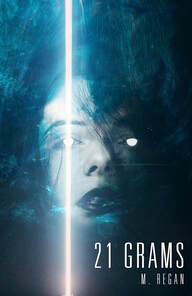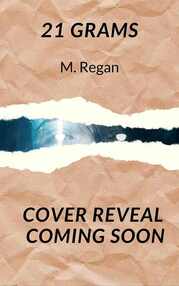|
When Timber Ghost Press first opened for business, we also opened for novel and novella submissions. We waded through the first few waves of submissions. Some of the stories didn't quite fit the tone we wanted to portray here at Timber Ghost. Some didn't quite make the mark. However, there was one submission that stood out in that first wave. That submission was 21 Grams by M. Regan. Their writing, voice, tone, and atmosphere was spot on. The story itself is beautiful, harrowing, and horrifying in so many different ways. Of course we had to say yes and publish it. Fast forward to today, and 21 Grams continues to garner praise and love from its readers. It got us thinking though, what influenced M. Regan? That led us to the question, what top five authors or books influenced you the most. Read on to find out. “Embarrassed” isn’t the right word. It’s not that I’m embarrassed. But there is a consensus of generally agreed-upon Influential Horror Writers (trademark pending) with whom credible authors are meant to align themselves. When such an author is asked, “whose work do you admire” or “whose work inspired you,” there ought to be at least one literary great thrown in there, if but to showcase the respect that is felt for this genre’s longstanding roots. Which brings us to a definitely-not-embarrassing confession from me, a person who is trying very hard to be a credible author: I don’t really care for any of the Influential Horror Writers (trademark pending). That isn’t to say I haven’t been informed by them or their work. There is, for example, a great deal of Mary Shelley’s influence in my debut novella, 21 Grams. That was entirely by design. And anyone who has a passing familiarity with my short stories will suspect I sold my soul to publish so many pieces that pay homage to Faust. I can— and do— acknowledge horror’s erudite sires. (I also pay my dues to the HWA, and make the appropriate ritual sacrifices when the stars are in alignment. I really am trying, here.) The issue, as it were, is that these foundational texts were not the foundation that I, as a young and impressionable reader, constructed my inner worlds upon. Instead, my teeth were cut on media that had been derived from them: that had taken and twisted those ideas and themes into tales more grandiose, more controversial, more depraved, more relevant, more innovative. By the time I was old enough to appreciate the source material, those original works felt very basic by comparison. They did not surprise me. They did not delight me. They did not do that which I most desire from the media I consume: They did not make me think. “Speaking of thinking,” you might now be muttering to your screen, “why do you think I care about your opinions on stories?” That is a very good question. And the answer is: you shouldn’t care! What do my feelings on this topic matter? You do you, as a great philosopher once said. If I don’t like something, more of that something for you to enjoy! Have at it and have fun. However, for those of you who think they might be interested in doing a bit more thinking, I offer humbly unto you: 5 Pieces of Horror/Horror-Adjacent Media That I Found Exceptionally Thought-Provoking GOTH by Otsuichi / translated by Andrew Cunningham (Novel) Originally published as a series of novelettes, this translated compilation of Japanese horror follows a pair of high schoolers who forge a permanent bond over their shared interest in darkness, death, and the endless parade of murders that just-so-happen to take place in their town. Think “Scooby Doo,” but the mysteries come to them. Also, Fred is a sociopath. This might be the time to admit I don’t know a ton about “Scooby Doo.” GOTH is a book about many things, but definitely not friendship. For people who enjoy stories about “man being the monster”— possibly literally— I cannot recommend this collection highly enough. The Bartimaeus Sequence by Jonathan Stroud (Novels) “But Regan,” you say, “I’ve just looked it up. This is a young adult series about magicians. It’s listed as a fantasy. It’s not horror at all.” To which I look you dead in the eyes, unblinking, for a solid 10 seconds before asking, “Have you read it?” Set in an alternate-universe London where the government is comprised of magicians, The Bartimaeus Sequence follows a young and ambitious boy named Nathaniel as he follows his political dreams with the (often begrudging) help of a snarky 5,000-year-old djinni named Bartimaeus. It is comedic, it is cutting, and there are scenes within its pages that scare me to this day. But more than that, it is important, exploring in explicit detail themes of exploitation, slavery, government corruption, and systemic abuse of the disenfranchised. I am on my knees begging you to toss your copies of Harry Potter and pick up Bartimaeus instead. Puella Magi Madoka Magica by Magica Quartet (Anime) In many ways, I’m being a bit of a hypocrite by including this one. But when Madoka first aired in 2011, it was revolutionary in the way it reinterpreted the “magical girl” genre. And unlike, say, the original books and plays about Faust, I happened to be around for this one. Hey, here’s a segue for you: For what wish might you sell your soul? Made of sugar, spice, and crushing existential horror, Puella Magi Madoka Magica is a phenomenally written and gorgeously produced animation that is sure to appeal to those who want a few more decapitations in Sailor Moon. From the New World (Shinsekai Yori) by Yusuke Kishi / A-1 Pictures (Anime) Set one thousand years after a telekinetic apocalypse has destroyed the world as we know it, a group of friends begin attending their local psychic school. But what about the other children in their town, the ones whose mental powers never manifest? What waits in the forests outside the utopian Kamisu 66? And what, ultimately, does it mean to be human? I was employed by Crunchyroll as a localization editor for a time, and of all the series I was privileged enough to work on, this was the one that most blew my mind. The Magnus Archives by Jonathan Sims (Podcast) A veritable shrine to all knowledge paranormal and esoteric, the Magnus Institute is an academic organization dedicated to the pursuit of supernatural research. They also have an exceptionally messy archive. Determined to derive order from chaos, the Institute’s new archivist, Jonathan Sims, has decided to try and digitize the written statements of people who claim to have experienced strange happenings. And from there— as if from the hub of a great web— the red threads start to spread, and tangle, and knot. This podcast is what sustained me through the beginning of the covid pandemic. Not to put too fine a point on it, but it is one of the most intricately crafted and phenomenally executed stories that I have ever been told, and I cried for four and a half days when it ended. If you are a fan of creepypasta, cosmic horror, and casual queer representation, give it a listen; there is a reason that this show has racked up so many awards. Well, then— I’ve shown you mine. Any interest in showing me yours? What stories have haunted you the longest? Which series have made homes in your brains? Which media have you found the most thought-provoking? Let me know! Give me something new to think about! M. Regan has been writing for over a decade, with credits ranging from localization work to short stories to podcast scripts. Fascinated by the fears personified by monsters, they enjoy dark fiction, studying supernatural creatures, and traveling to places rich with folklore. Find them on Twitter and Facebook.
We are very excited to announce we have signed author, M. Regan! She wrote a novella that pulled us in with the very first words and never let us go. 21 Grams, will come out in July of 2021.
21 Grams: In the bowels of an unassuming, ever-moving funerary parlor, a mortician known as the Operator hides a fearsome machine called the Godwin, rumored to have the ability to resurrect the dead. It runs, like a soul does, on logos: on words. And in exchange for those words—for a client’s life story—the corpse of their choosing might yet walk again. Careful, though. Words bear weight, so one must choose them wisely. Author M. Regan delivers a harrowing and beautiful glimpse into a world filled with desire, darkness, love, and loss. M. Regan: M. Regan has been writing for over a decade, with credits ranging from localization work to short stories to podcast scripts. Fascinated by the fears personified by monsters, they enjoy dark fiction, studying supernatural creatures, and traveling to places rich with folklore. Find them on Twitter and Facebook at MReganFiction. |
Archives
June 2024
Categories
All
|



 RSS Feed
RSS Feed